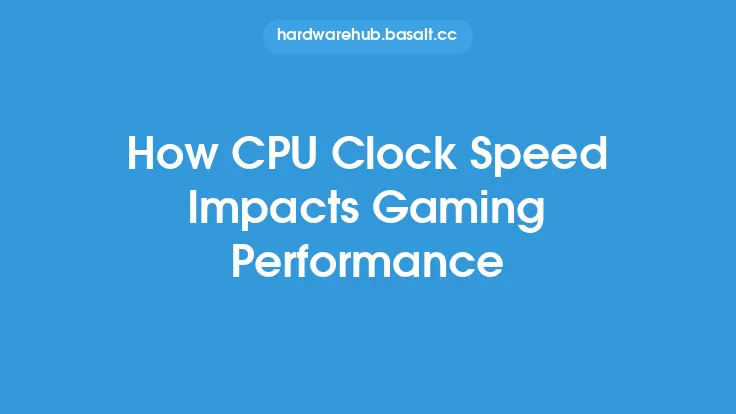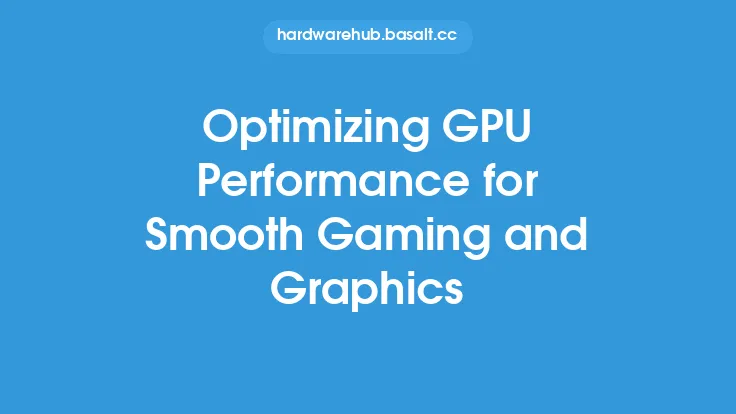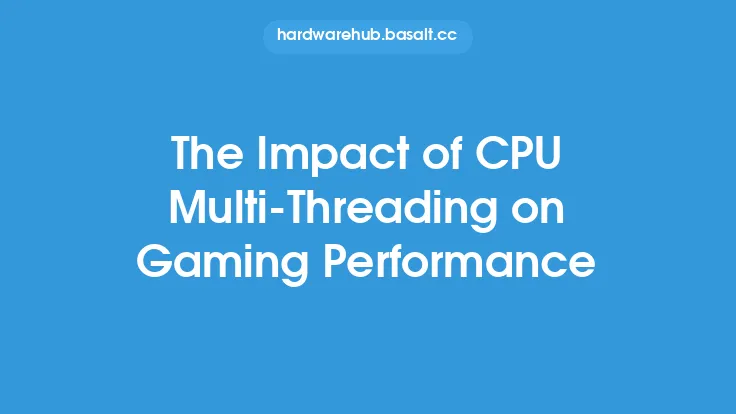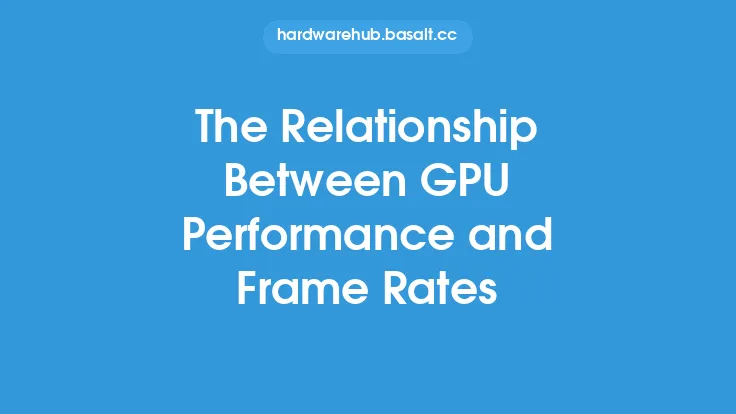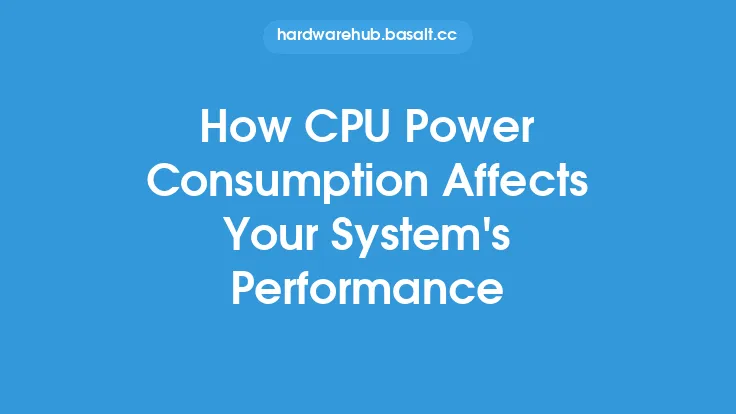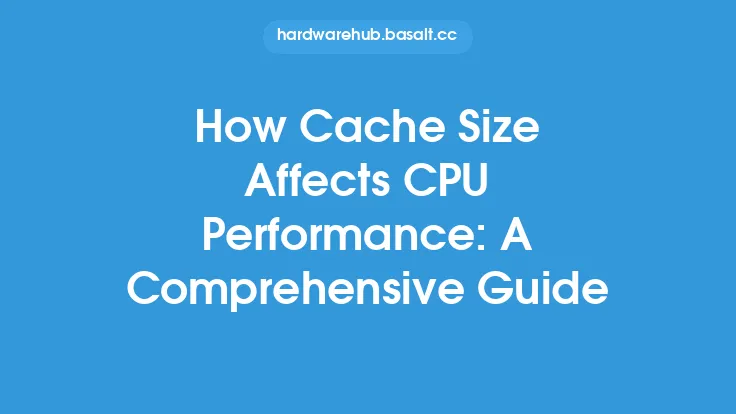The performance of a Graphics Processing Unit (GPU) plays a crucial role in determining the overall gaming experience. A GPU is responsible for rendering images on a screen, handling complex graphics, and performing compute tasks. In the context of gaming, a high-performance GPU can significantly enhance the visual quality, frame rates, and responsiveness of games. In this article, we will delve into the details of how GPU performance affects gaming, exploring the key factors that influence gaming performance and the technical aspects of GPU architecture.
GPU Architecture and Gaming Performance
A GPU's architecture is designed to handle massive parallel processing, which is essential for gaming. The GPU consists of several key components, including the graphics processing clusters, memory interfaces, and render outputs. The graphics processing clusters are responsible for executing graphics shaders, which are small programs that run on the GPU to perform tasks such as 3D rendering, texture mapping, and lighting calculations. The memory interfaces provide a high-bandwidth connection between the GPU and system memory, allowing for fast data transfer and minimizing latency. The render outputs are responsible for generating the final image on the screen.
In terms of gaming performance, the GPU's architecture plays a critical role in determining the frame rates, resolution, and visual quality. A high-performance GPU with a large number of processing units, high memory bandwidth, and advanced render outputs can handle demanding games at high resolutions and frame rates. For example, a GPU with a large number of CUDA cores (in the case of NVIDIA GPUs) or stream processors (in the case of AMD GPUs) can handle complex graphics and compute tasks, resulting in smoother gameplay and higher frame rates.
GPU Performance Metrics and Gaming
Several GPU performance metrics are relevant to gaming, including frame rates, resolution, and graphics quality. Frame rates measure the number of frames rendered per second, with higher frame rates resulting in smoother gameplay. Resolution refers to the number of pixels rendered on the screen, with higher resolutions requiring more processing power and memory bandwidth. Graphics quality encompasses various aspects, including texture detail, lighting, and shadows, which can significantly impact the visual quality of games.
In addition to these metrics, other factors such as memory bandwidth, latency, and power consumption also influence gaming performance. Memory bandwidth determines how quickly data can be transferred between the GPU and system memory, while latency affects the responsiveness of the game. Power consumption is also an important consideration, as it can impact the overall system performance and heat generation.
GPU Memory and Gaming Performance
GPU memory plays a critical role in gaming performance, as it determines the amount of data that can be stored and processed by the GPU. The type and amount of GPU memory can significantly impact gaming performance, with higher-capacity memory allowing for more detailed textures, higher resolutions, and smoother gameplay. There are several types of GPU memory, including GDDR6, HBM2, and GDDR5, each with its own strengths and weaknesses.
GDDR6, for example, offers high bandwidth and low power consumption, making it suitable for high-performance gaming applications. HBM2, on the other hand, provides even higher bandwidth and lower power consumption, but is more expensive and complex to implement. GDDR5 is an older technology, but still widely used in mid-range and budget GPUs.
Multi-GPU Configurations and Gaming Performance
Multi-GPU configurations, such as NVIDIA's SLI (Scalable Link Interface) and AMD's Crossfire, allow multiple GPUs to work together to enhance gaming performance. These configurations can significantly improve frame rates, resolution, and graphics quality, but also introduce additional complexity and cost.
In a multi-GPU configuration, each GPU processes a portion of the graphics workload, with the results combined to produce the final image. This can result in significant performance gains, but also requires careful synchronization and communication between the GPUs. Additionally, not all games are optimized for multi-GPU configurations, which can limit their effectiveness.
GPU Cooling and Gaming Performance
GPU cooling is essential for maintaining optimal gaming performance, as high temperatures can significantly impact GPU performance and longevity. There are several types of GPU cooling systems, including air cooling, liquid cooling, and hybrid cooling.
Air cooling uses fans to dissipate heat from the GPU, while liquid cooling uses a liquid coolant to absorb heat and transfer it to a radiator. Hybrid cooling systems combine air and liquid cooling to provide optimal performance and quiet operation. Effective GPU cooling is critical for high-performance gaming, as it allows the GPU to operate at optimal temperatures and maintain peak performance.
Conclusion
In conclusion, GPU performance has a significant impact on gaming, influencing frame rates, resolution, and visual quality. The GPU's architecture, performance metrics, memory, and cooling system all play critical roles in determining gaming performance. Understanding these factors can help gamers and enthusiasts make informed decisions when selecting a GPU for their gaming needs. Whether you're a casual gamer or a hardcore enthusiast, a high-performance GPU can enhance your gaming experience and provide a more immersive and engaging experience.
